If you're planning a church retreat, consider incorporating uplifting activities that strengthen community bonds and inspire spiritual growth. Start with innovative themes, like vision boards, to express personal and collective goals. Engage everyone through team-building exercises such as ropes courses or scavenger hunts, and offer workshops on valuable skills like conflict resolution. Don't forget reflective practices, like journaling and guided meditation, to deepen participants' faith connections. You can even keep it budget-friendly by partnering with local venues and organizing meals as potlucks. There's so much more you can explore to make your retreat impactful and meaningful.
Key Takeaways
- Organize interactive workshops on leadership skills to promote personal growth and strengthen community ties.
- Incorporate team-building exercises like scavenger hunts to enhance relationships and foster collaboration.
- Offer guided meditation and prayer sessions to deepen faith and encourage spiritual renewal.
- Facilitate journaling and reflection exercises for personal insights and shared spiritual experiences among participants.
- Host potluck-style meals to promote fellowship while maintaining economic feasibility and community engagement.
Innovative Retreat Themes
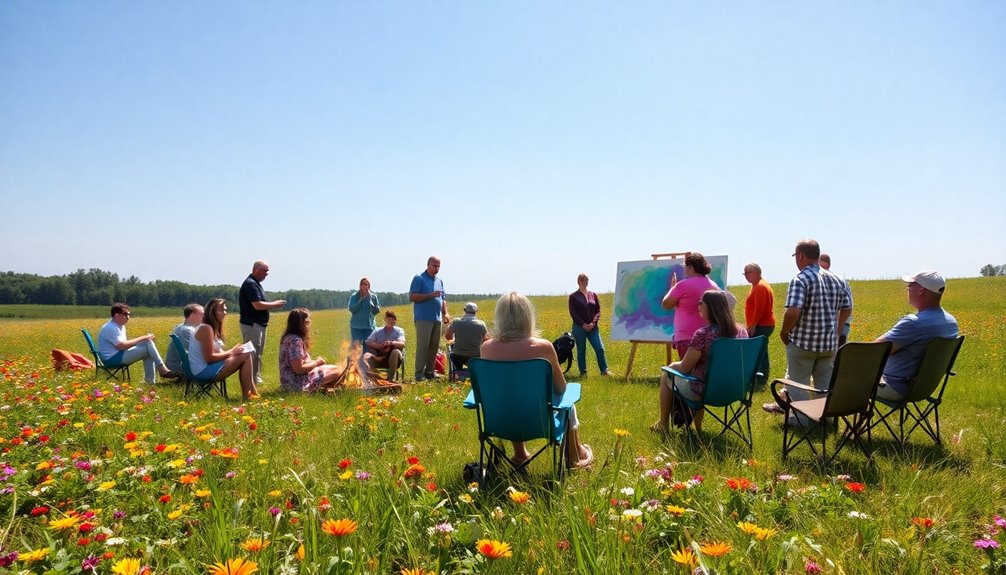
When planning a church retreat, innovative themes can transform the experience from routine to inspiring. Consider integrating activities like vision boards, where participants can express personal and collective goals, aligning them with the church's mission.
Interactive workshops led by guest speakers can focus on essential leadership skills, enhancing personal and professional growth. Incorporate team-building exercises, such as ropes courses or scavenger hunts, to deepen relationships among church leaders.
Don't forget to assess the specific needs of your group; gathering input guarantees that the retreat activities resonate with everyone involved. Additionally, fostering trust and boundaries during group activities can enhance collaboration and create a safe space for open communication.
Finally, use digital tools for remote participation, ensuring inclusivity and broadening access to valuable insights, making your retreat not just innovative but also impactful.
Engaging Group Activities

To create a memorable church retreat, engaging group activities are essential for fostering connection and community.
When you're planning a retreat, consider incorporating a mix of fun and meaningful experiences that bring everyone together.
Here are some ideas to get you started:
- Team-building exercises like ropes courses and scavenger hunts
- Interactive workshops on leadership topics, such as conflict resolution
- Journaling sessions for personal reflection and sharing in small groups
- Icebreakers and fun challenges to create a lively atmosphere
- Digital integration tools for remote participation, ensuring no one misses out
These engaging group activities will strengthen bonds and inspire participants, making your retreat truly unforgettable!
Spiritual Renewal Practices
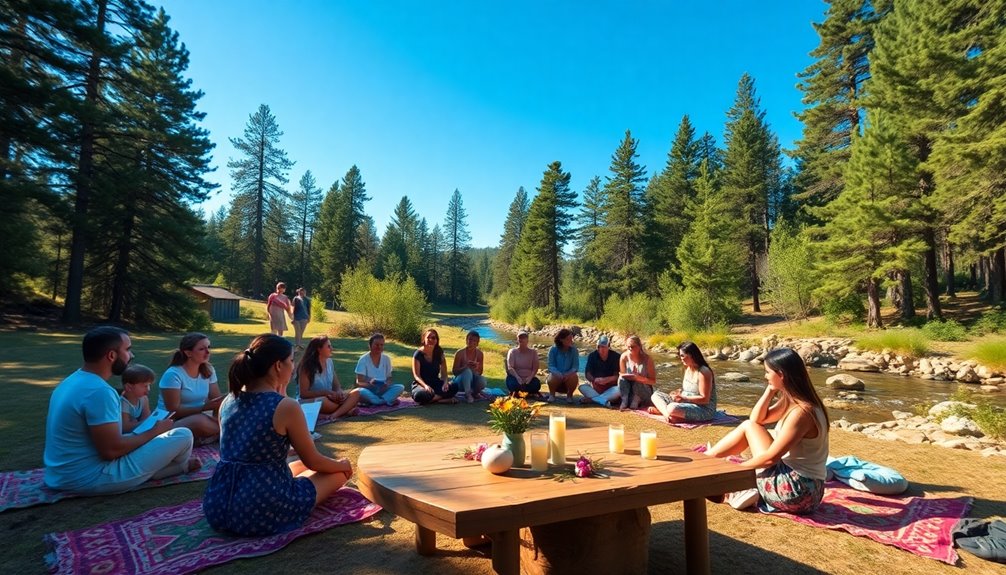
Spiritual renewal practices play an essential role in revitalizing your faith and enhancing emotional well-being during a church retreat.
Guided meditation and prayer sessions can deepen your connection to faith, while journaling and reflection exercises allow you to assess your personal and spiritual journey. These practices encourage meaningful discussions in small groups, fostering a supportive environment.
Don't underestimate the power of quiet reflection; it helps combat spiritual burnout, giving you the chance to recharge and seek divine guidance for your ministry.
Integrating these spiritual renewal practices into your retreat won't only uplift your spirit but also strengthen your community's bonds, ensuring every participant leaves feeling inspired and renewed.
Team-Building Exercises
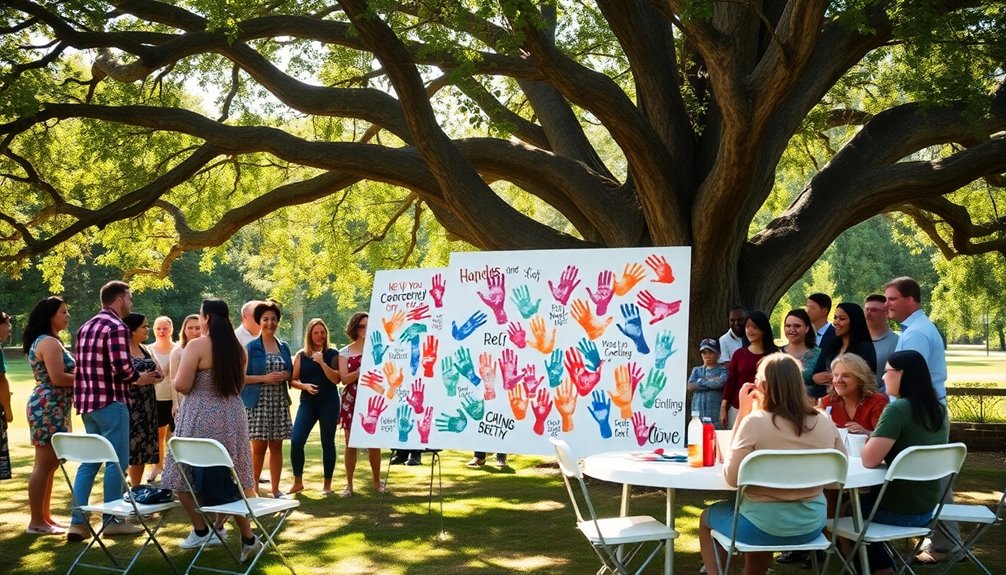
Building on the spiritual renewal practices you've engaged in, incorporating team-building exercises can further strengthen the bonds within your church community.
These activities enhance collaboration among your leadership team and help foster deeper relationships. Here are some engaging ideas you can implement:
- Outdoor ropes courses to build trust
- Scavenger hunts that promote problem-solving
- Icebreakers to create a relaxed environment
- Fun group challenges for open dialogue
- Regular activities to boost retention rates
Workshops for Skill Development

Workshops for skill development can transform your church leadership team by equipping them with essential tools to navigate everyday challenges.
Interactive sessions on leadership skills, like conflict resolution and emotional intelligence, provide practical insights that enhance effectiveness.
During the planning and preparation phase, tailor workshops to address the specific needs and challenges your team faces. Incorporating guest speakers can offer fresh perspectives and inspire innovative approaches to community engagement.
Facilitating group discussions promotes collaboration and allows participants to share valuable experiences.
To guarantee long-term growth, consider offering follow-up resources and support after the workshops. This approach reinforces learning and encourages ongoing skill development, ultimately contributing to a more effective and united church community.
Reflection and Journaling Time

During your retreat, set aside time for personal reflection and journaling with guided prompts that help you explore your spiritual journey.
This practice not only deepens your self-awareness but also creates a foundation for meaningful sharing sessions with others.
Personal Reflection Prompts
How can personal reflection prompts transform your experience at a church retreat? When you spend time reflecting on your faith, these prompts can guide your journey and deepen your insights.
Here are some ways to engage:
- Describe a moment when you felt closest to God.
- Identify your greatest strengths and challenges as a leader.
- Reflect on what being a leader in your church means to you.
- Set personal goals for your faith and leadership journey.
- Explore how your insights can benefit the church community.
Journaling during retreats allows you to articulate your thoughts, fostering self-awareness and personal growth.
Embrace this opportunity; it can lead to actionable plans that enhance both your spiritual and communal life.
Group Sharing Sessions
What if group sharing sessions could transform your church retreat experience? By creating a safe environment for open dialogue, you'll encourage participants to express their thoughts and experiences related to faith and leadership.
Incorporating journaling time allows for personal reflection, enhancing the depth of discussions within your small group. Use structured prompts to guide these journaling exercises; they'll help articulate feelings that can be shared later.
After journaling, facilitate small group discussions to promote intimacy and trust, forging deeper connections among members. This dedicated time for reflection and sharing can greatly reduce feelings of isolation, fostering a supportive network within your church community.
Embrace these sessions to uplift and inspire everyone involved.
Digital Tools for Connection
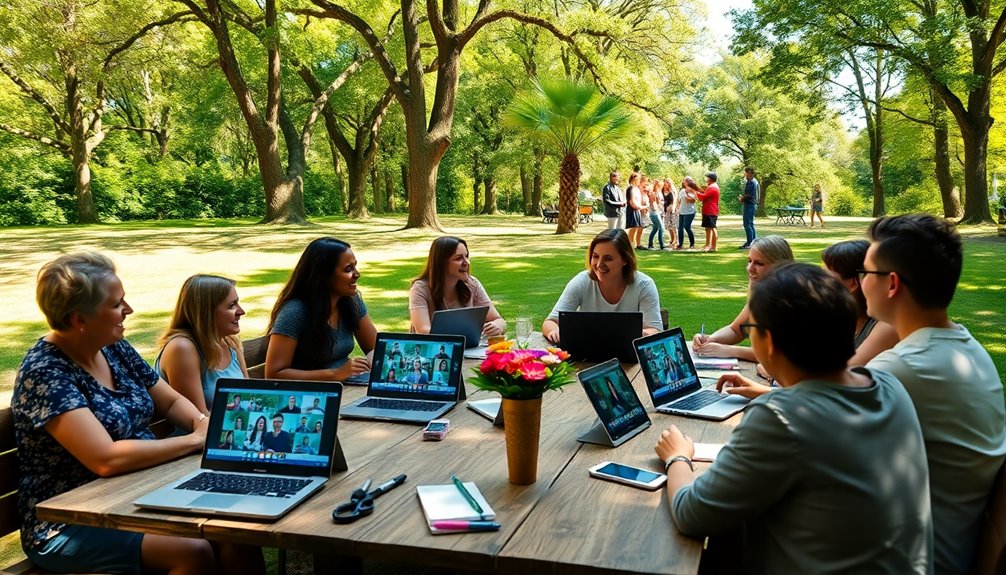
As you plan your church retreat, incorporating digital tools can enhance connection among participants, especially those who can't attend in person.
These tools can greatly boost community building and guarantee everyone feels included.
- Use Zoom or Microsoft Teams for remote participation in discussions.
- Create a Slack or Discord channel for ongoing communication.
- Leverage Facebook Groups or Instagram for event updates and sharing experiences.
- Conduct digital surveys post-retreat to collect feedback.
- Utilize Google Docs and Trello for efficient planning and collaboration.
Cost-Effective Retreat Strategies
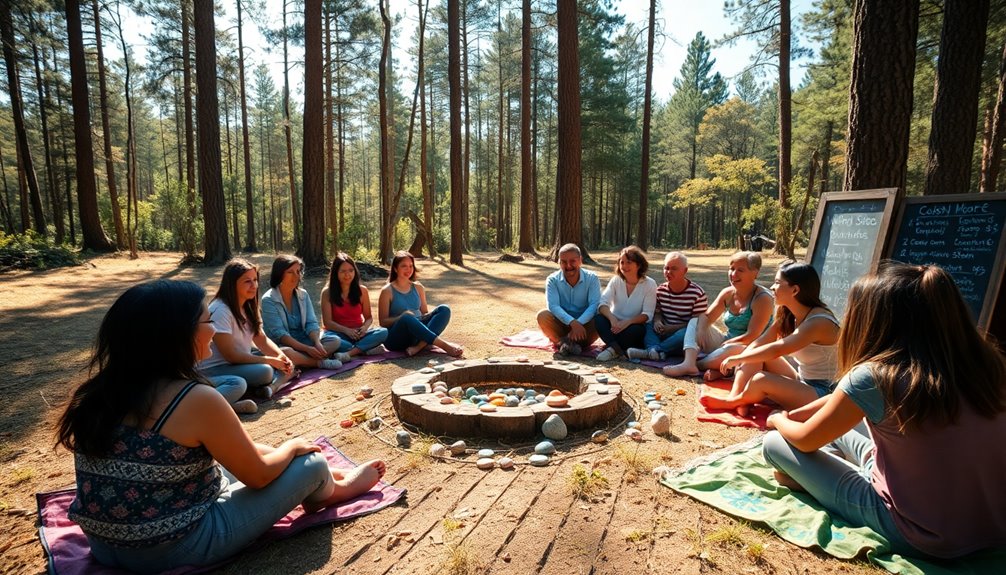
Planning a church retreat on a budget is entirely achievable with some strategic thinking and creativity. One of the best cost-effective retreat strategies is to partner with local venues or other churches, which can provide facilities at reduced rates or even free of charge.
Utilizing volunteers to help with planning and executing the retreat not only saves money but also strengthens community ties. Consider exploring virtual retreat options, too—this can eliminate travel and lodging expenses, allowing participants to join from home.
Developing a clear budget helps keep expenses in check, while organizing potluck-style meals encourages fellowship and reduces food costs. Additionally, involving community members in the planning process can enhance community engagement and foster a sense of ownership over the retreat. With these ideas, you can create an inspiring retreat that's both meaningful and economical.
Measuring Retreat Success
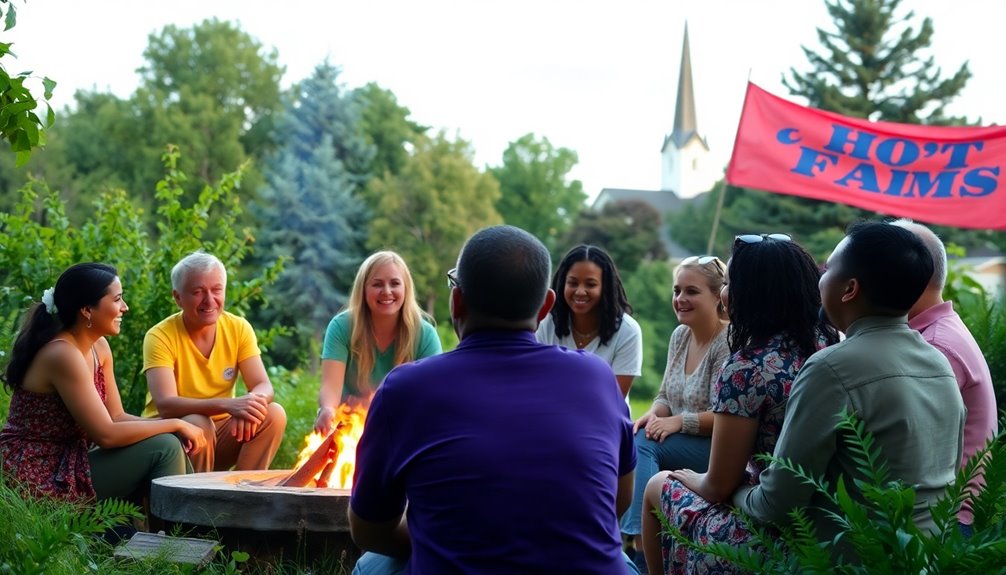
To truly measure your retreat's success, start by establishing clear objectives that align with participants' needs.
After the event, monitor tangible outcomes and conduct post-retreat evaluations to assess the impact. This approach not only highlights strengths but also identifies areas for improvement, ensuring future retreats are even more effective. Additionally, incorporating goal-setting strategies can enhance participant engagement and focus during the retreat.
Establish Clear Objectives
Establishing clear objectives is essential for a successful church retreat, as it aligns activities with the desired outcomes. When you establish clear objectives, you guarantee that retreats offer meaningful experiences for everyone involved.
Here are some key points to contemplate:
- Set SMART (Specific, Measurable, Achievable, Relevant, Time-bound) objectives.
- Evaluate participant engagement and satisfaction through feedback.
- Identify areas for improvement based on retreat outcomes.
- Regularly review past objectives to guide future planning.
- Measure success through concrete outcomes like increased teamwork.
Additionally, consider integrating diversification strategies in your retreat activities to cater to various interests and enhance participant involvement.
Monitor Tangible Outcomes
Measuring the success of your church retreat is essential for understanding its impact on participants and the community. To monitor tangible outcomes, start by establishing clear objectives like improving teamwork or enhancing spiritual growth.
After the retreat, conduct surveys to gather feedback on participant experiences, evaluating shifts in attitudes, skills, and relationships within the church. You should also evaluate changes in leadership effectiveness by observing team dynamics and engagement levels.
Track participation rates in church activities post-retreat; increased involvement often signals a successful impact on community engagement. Finally, review feedback and outcomes from previous retreats to identify trends.
This will help you tailor future events better. Next time, guarantee you're prepared to measure what truly matters.
Conduct Post-Retreat Evaluations
After you've monitored tangible outcomes from your church retreat, it's time to conduct post-retreat evaluations. Gathering feedback is essential for understanding what worked well and what could improve.
Consider these steps to guide your evaluation process:
- Distribute surveys to collect participant insights
- Compare results against your pre-set objectives
- Identify strengths and areas for improvement
- Analyze feedback for actionable insights
- Engage in follow-up discussions with your leadership team
These post-retreat evaluations will help you measure success and guarantee future retreats align with your community's needs.
Frequently Asked Questions
What Are the Activities for Bible Retreat?
When planning activities for a Bible retreat, consider incorporating interactive workshops that focus on Scripture interpretation.
You can also include journaling exercises, allowing you to reflect on your faith journey.
Team-building activities like ropes courses foster collaboration, while prayer and worship sessions enhance spiritual connections.
Don't forget to invite guest speakers to share insights on leadership topics that can help you develop essential skills for your community's growth.
What Makes a Good Church Retreat?
A good church retreat focuses on a relevant theme that resonates with participants' needs.
You'll want to include a mix of engaging activities, like team-building exercises and reflective journaling, to foster connection and personal growth.
Prioritizing time for prayer and discernment helps combat burnout and encourages spiritual renewal.
Gathering feedback afterward lets you assess the retreat's impact, ensuring future events are even more meaningful and aligned with your community's goals.
What Are Team Building Activities at Retreats?
Team building activities at retreats can really enhance collaboration and communication among participants.
You might consider outdoor challenges like ropes courses or scavenger hunts to encourage problem-solving and teamwork.
Interactive workshops led by guest speakers on emotional intelligence can help you develop essential leadership skills through engaging discussions.
Don't forget icebreaker games and small group discussions; they create a relaxed atmosphere for personal sharing and connection, building trust and camaraderie among everyone involved.
How Can a Church Reach Out to the Community?
You see a vibrant community bustling with life, yet there's a disconnect where your church stands.
To bridge this gap, start by hosting engaging events like food drives or family fun days that invite everyone in.
Partner with local organizations to amplify your outreach, and offer volunteer opportunities that resonate with community needs.
Don't forget to use social media to share your initiatives, drawing in those who mightn't yet feel connected.
Conclusion
Incorporating these church retreat ideas can truly uplift and inspire your community. Did you know that 70% of participants report feeling more connected to their faith after a retreat? Imagine the impact you could create by fostering deeper relationships and spiritual growth within your group. By choosing engaging activities and ensuring everyone feels included, you'll not only strengthen bonds but also spark a renewed sense of purpose. So, get started on planning a transformative retreat today!









